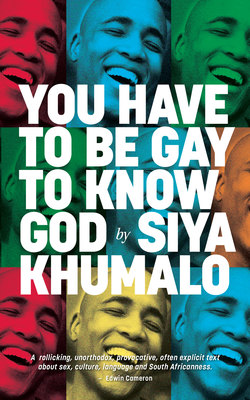Читать книгу You Have to Be Gay to Know God - Siya Khumalo - Страница 3
На сайте Литреса книга снята с продажи.
Foreword
ОглавлениеIn January 2014, the name Siya Khumalo leapt into my inbox. It landed there with an arresting energy that has not waned. Anthony Waldhausen, who started and runs the KZN Gay and Lesbian Network in Pietermaritzburg, wrote introducing him to me. Siya worked by day for a large retail organisation. At night he blogged, attacking stupid beliefs and misconceptions about gay and lesbian, transgender and other gender-diverse people.
His voice was dry, penetrating and deeply insightful. Soon, it found a national audience. Astonishingly opinionated, sometimes nearly impenetrably oblique, he wrote incisively about our national crisis of governance and culture. Imbued from birth with isiZulu language and heritage, his commentaries on our former Zulu-speaking President were particularly unflinching, sometimes breath-taking in their boldness.
Now Siya has written a book. This book. It aims for the thoroughly vulnerable: and finds its mark. It is impassioned – moving and unsettling in its intensities, the writing sometimes painfully vivid – but above all, its achingly poignant insights about our national life are absorbingly fresh and funny.
When Siya first explained the concept behind it to me, we revelled in its potentially subversive rationale for showing the ravages of religion-based homophobia on our politics, the economy, and on us as people. Siya sympathises with those who are caught in the cross-hairs of religious arguments about homosexuality. That’s why his instinct was to go beyond secular arguments to the theological roots of homophobia, attacking it from within the religious discussion.
He then invited me to pen the foreword. After thought, I agreed. I generally provide forewords only to legal books; more rarely, to texts about HIV and AIDS. This request was for a rollicking, unorthodox, provocative, often explicit text about sex, culture, language and South Africanness. What a risky project: to insert myself (and my job title) into that. But I agreed, happily and proudly, because the book pierces through beliefs that are still deadly to too many LGBTI people in our country and in Africa. It also offers an unmatched glimpse into the complexity and truths of ordinary South African lives; by ‘ordinary’ I mean those lived by citizens outside the still largely-white middle-class suburbs of our cities. The Constitution is often removed from South Africans’ lives, ironically, because the religious freedom it upholds is invoked to stifle other rights; its promise of freedom from religion allows those not directly enmeshed in the practice or effects of religious homophobia to look the other way.
Intriguingly, Siya contends that we are all indirectly implicated in – and thus victimised by – religious bigotry. His insights are relentless and illuminating. His book could enhance the work NGOs do. It should be used for teacher training and university courses that study how human beliefs evolve to shape societies.
Practical interventions to remedy misconceptions hold a particular claim on me. Just over twenty years ago I nearly died of AIDS. Millions of our fellow South Africans (and millions more of Africans) did die: from ignorance, misbelief and inaction. It took the aggressive, angry and principled interventions of organisations led by the Treatment Action Campaign, which were riveted in place by a brave Constitutional Court judgment, to secure elementary rationality in our national response to HIV/AIDS. The freshness of these events in our national memory informs the context of Siya’s writing and is partly why his voice is searingly angry and principled. His target is avoidable and interconnected suffering; he explores who has a vested interest in stigmatising ‘otherness’ to sustain suffering and exclusion.
So I commend You Have to Be Gay to Know God. Attention, if not to its political polemics (on which I stand strictly impartial, as my job requires), then certainly to its thinking, will be rewarded.
Generously, Siya has said that his choice to speak out on homophobia was a ripple effect of my choice to come out and speak up, from a deeply personal vantage, about sexuality and AIDS. Writing this foreword, commending this vivid voice and its sometimes compelling insights to you, the reader, rings the ripples round for me. It may even prolong and extend their interconnecting beneficent effects.
Edwin Cameron
Constitutional Court of South Africa
16 January 2018
